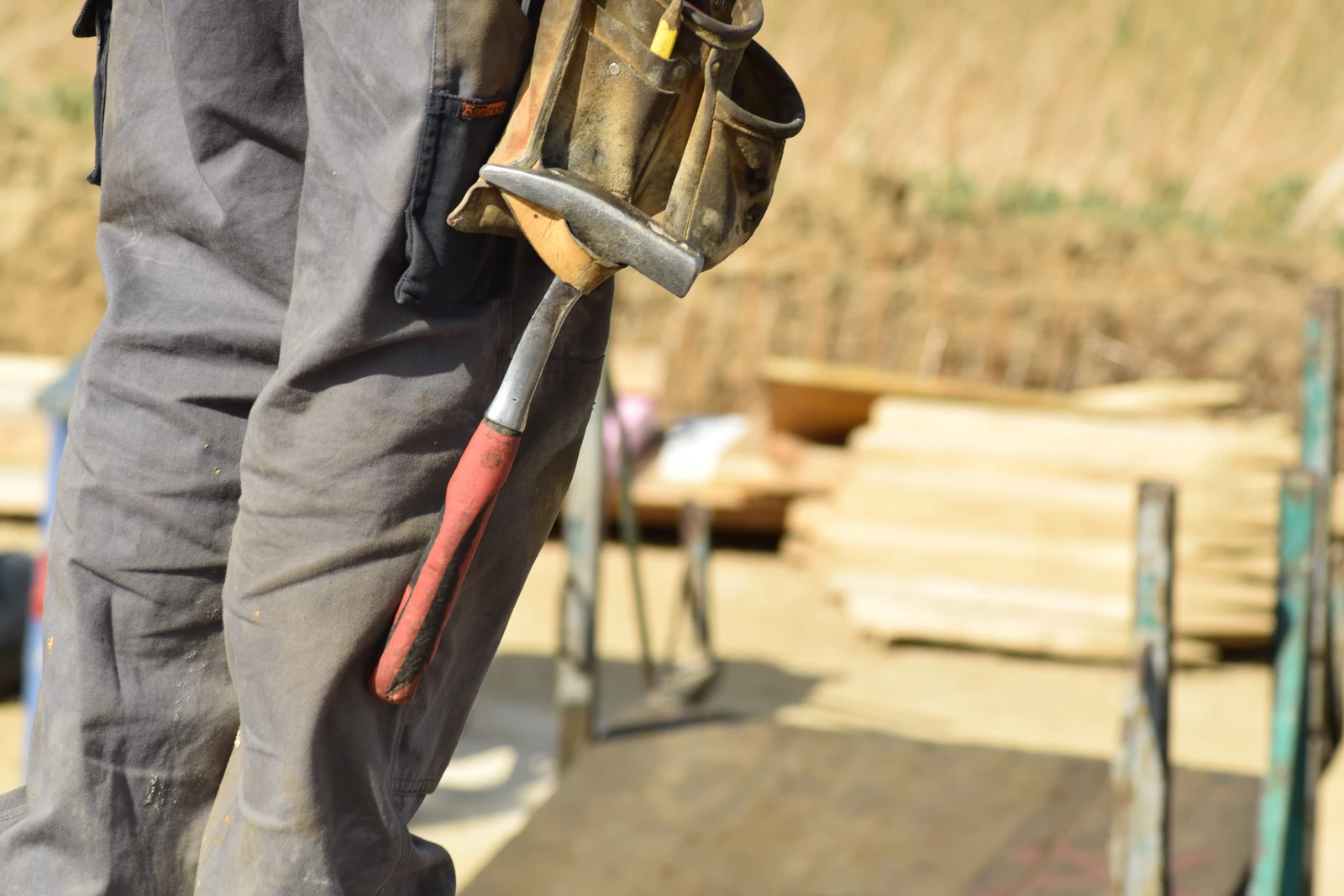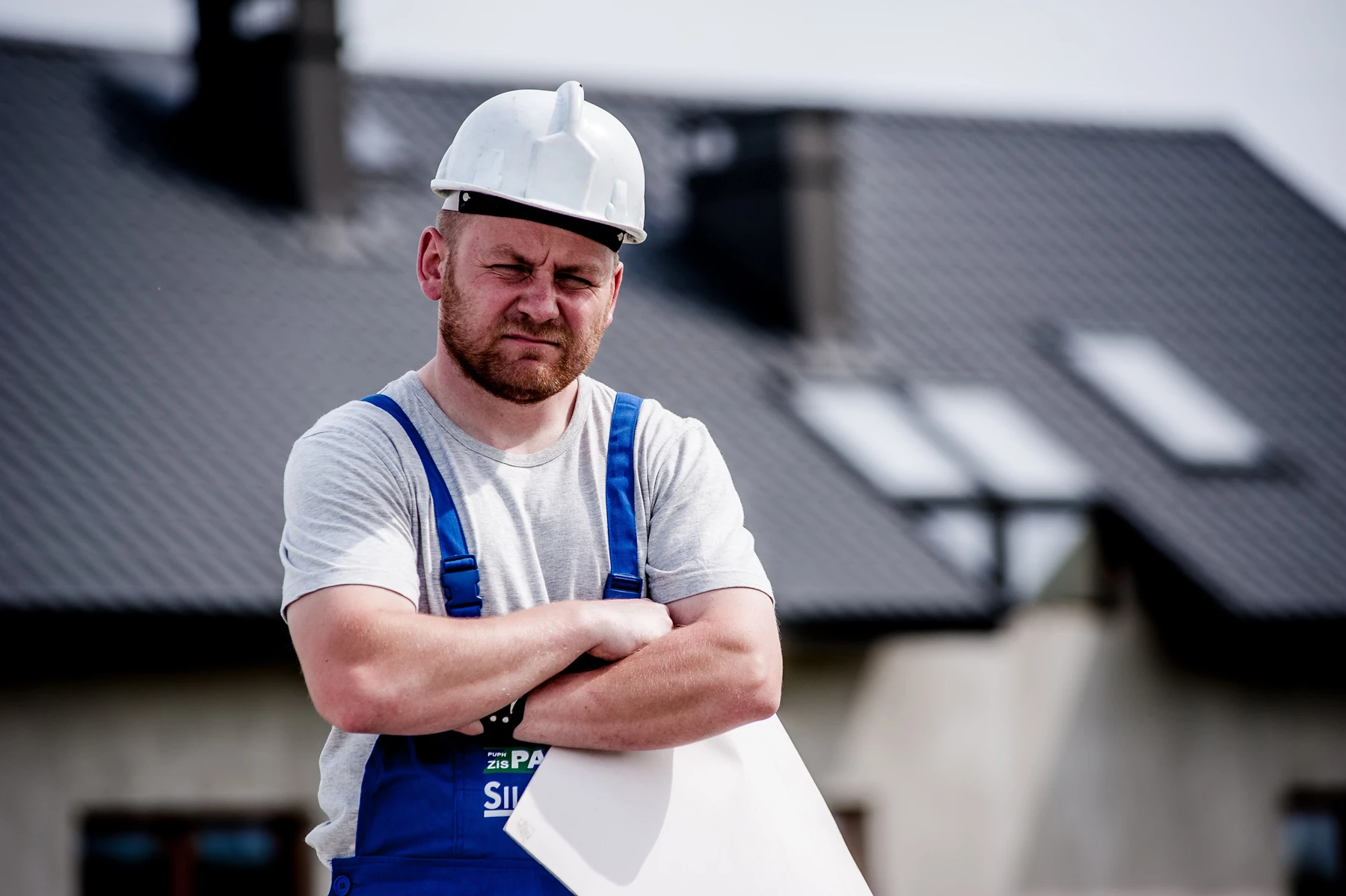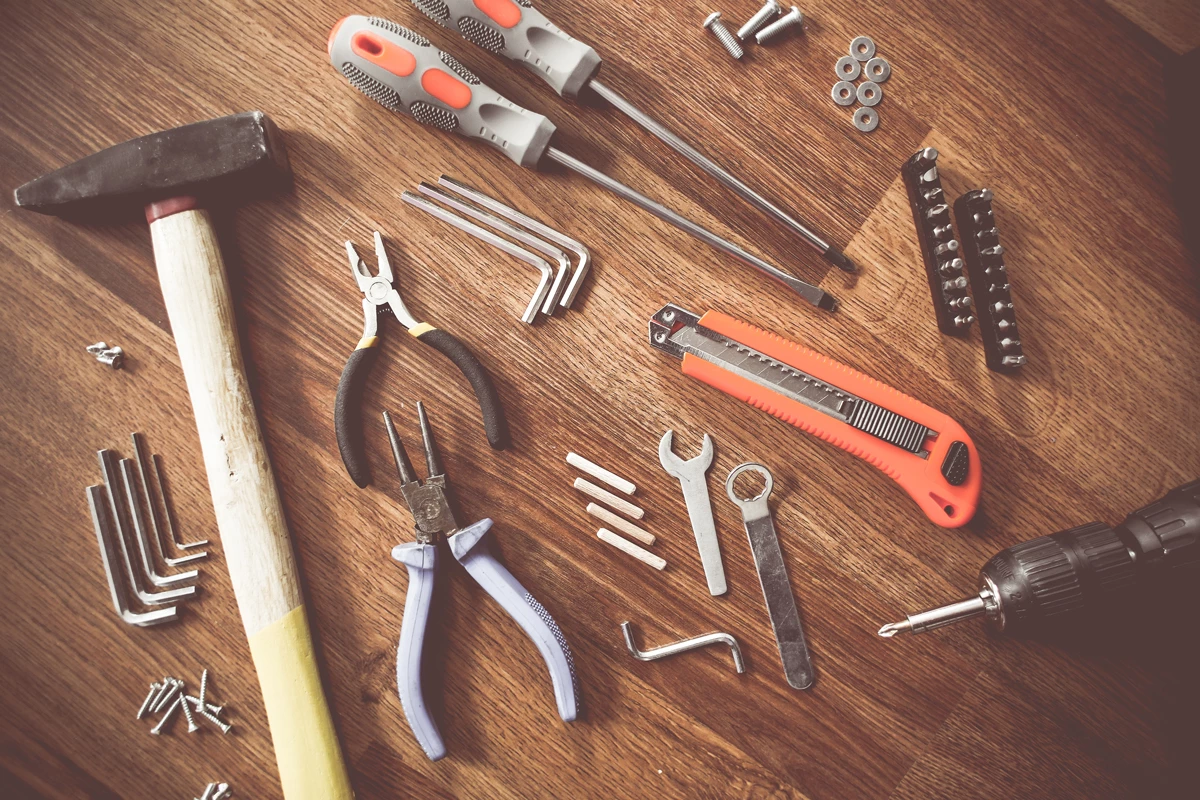10/10/2019 | Category: Home Insurance

Ever dreamed of staring in your very own version of Grand Designs? Maybe you’re already in one, signing off the final plans for that incredible home you’ve always wanted to build. Before you start swinging the hammer, you’ll need to decide whether you want to take on the build all by yourself or hire a main contractor to take care of the logistics for you.
In this article, we’ll look at the self-build process and what it entails. We’ll outline the pros and cons of taking on a home construction project yourself, versus hiring a contractor to carry out the work. We’ll also discuss why it’s so vital to take out under construction home insurance so that you’re protecting yourself every step of the way.
What is a self-build home?
The National Custom and Self Build Association, or NaCSBA, defines a home-building project as ‘self-build’ if the homeowner is the one directly organising the construction and design of the property in question. Within those parameters, there are many different versions and options of what that could look like.
Indeed, as a homeowner, you can take on as much or as little of the project as you want. Whether you’re only loosely overseeing the build while a package home company takes care of the rest or getting your hands well and truly dirty by mucking in with the construction crew, what you’re doing still falls under the remit of ‘self-build’.
Ideally, self-build is a good route to take if you’re looking to design and build more of a ‘forever’ home, rather than just looking to buy a house you’re likely to sell in a few years’ time. As such, it’s suitable for retirees, growing families after additional space or simply those looking to design a space around their lifestyle.
Self-builds are very popular in countries and regions boasting a good amount of land to develop on – think Belgium, Austria, Scandinavia. That being said, there’s also a fair amount of ‘self-build’ activity happening right here in the UK. Over 12,000 self-build projects are finished here on a yearly basis. In 2017, these numbers rose to 13,000 for the year and currently there are 1 in 7 in the UK researching how to build their own house.
Most of these projects take around two years to turnaround, from locating and buying a plot to ‘turning the key’ in the door of a brand new, finished property.
Is it possible to build your own house?
Given that over 12,000 homes are built in the UK every year, the answer is a resounding yes!
Yes, it’s entirely possible for you to build your own house, even without a background or qualifications in construction. In fact, most homeowners who embark on the ‘self-build’ adventure don’t have backgrounds or experience in construction (of course, it’s a massive plus if you do).
Furthermore, the UK government is trying to make it easier for people to build their own homes in a bid to increase only 8% of homes being self-built every year to 35% of new homes. Their Right to Build scheme, which helps local authorities source more plots ideal for self-builds, is a central part of this pledge.
New mortgage packages designed specifically for self-builders, the waving of stamp duty (which is now only paid on the land above £125,000) and the appeal of cheaper land available in certain parts of the UK is also making self-building much more viable and realistic for the general public.
If you do decide to self-build then there are many ways to get involved in your project, from project managing to overseeing scheduling – even bringing labourers hot tea and Hobnobs could count as participating!
Is managing my self-build right for me or should I hire a contractor?
In all seriousness, if you do fancy overseeing some of the more demanding parts of your build, in other words, conducting the self-build entirely yourself without a contractor then there’s definitely nothing from stopping you. What you do need to do is pose yourself a few key questions:
Does it feel right for me to get fully involved in my self-build? Is it a process I can see myself enjoying? Or, does it involve the kind of stress I’m likely to run away from?
What skills do I possess that could be useful? Am I good at things such as organising, planning and scheduling and budgeting? What are my strengths and what am I not so good at? Will I have the time around my job / family life to manage this project properly?
Among other factors like budget, timeframe and how far you live from the building site, being clear with yourself on the answers to these questions will indicate whether or not you should take on most of the responsibility of your ‘self-build’ or if you should delegate some of it to a main contractor.
In fact, one of the key decisions you’re likely to make when building your own house is whether to shoulder most of the work or assign this to a main contractor who will take care of the hiring and scheduling of subcontractors.
Self-building your home
Up for an adventure of a lifetime that you’ll remember for years to come? Feeling confident about taking on a massive project with many moving parts and people?
If you get excited by the prospect of building things and overseeing large projects, then managing most, if not all of the construction yourself could be a great way to go.
What are the pros of building yourself?
-
Personal satisfaction
One of the biggest upsides of overseeing a self-build is the sense of personal satisfaction to be gleaned from being physically involved in the construction of your house. It can give you a huge sense of pride and wonderful memories for years to come.
-
Cost savings
Many take the self-built route because of the potential cost savings. In some cases, you could stand to save up to 30-40 per cent on materials and labour costs. That is if you are highly organised and have a nose for hunting down some good bargains.
-
Customisation
Self-building allows you to tailor your new living space exactly to your needs. By overseeing the day-to-day action of the build, you’ll have greater control over making sure things are built to your specifications.
What are the cons?
-
Scheduling challenges
Coordinating all the different people involved in building your dream house can be a challenge. If tradespeople don’t arrive on time, in the right order and with the right supplies things can quickly spiral out of control. Before you know it, you could end up losing money due to poor scheduling.
-
Budget creep
Sticking to your budget (or not) could very well make or break your ‘self-build’ project. Any change or upgrade you make during the course of the project costs more money and time.
-
Learning curve
Taking on the bulk of the project management and scheduling means you’ll likely need to acquire some new skills at an additional cost. Unless you’re already experienced in running construction projects, you’ll probably need to take a course like this one by the National Self Build & Renovation Centre to learn how to do it properly.
-
Planning for contingencies
Whatever your budget is, you’ll need to plan an extra fund of 10-20% of the total build cost to cover unexpected costs, delays, or problems along the way. And that’s before you allocate extra funds for groundworks, as complications below ground (such as soil contamination) can really set you back.
-
Planning permission hiccups
Ah, planning permission. Many homebuilders have had a considerable challenge in securing it and can get really unstuck if not careful (though there are also huge gains to be made if you get it right).
If you’ve taken your self-build on completely by yourself, you’ll be responsible for applying for planning permission, which costs roughly £462 to put in an application with your local council. You’ll need to ensure the final product meets the conditions on which permission has been granted (otherwise it will be deemed illegal).
-
People management
This is perhaps one of the most challenging aspects of taking on a self-build project completely on your own. You’ll need to maintain a good working relationship with your contractors. Failing to do so could lead to disagreements or even walkouts.
Using a contractor to build your home
Now, if the thought of taking on a massive building project fills you with terror, rather than excitement after reading all of that, fear not. You can still go down the ‘self-build’ route while forgoing the hassle of managing and hiring your own tradespeople by hiring a main contractor.
Whether a large national company or a smaller local firm, a main contractor gives you one entity to deal with. You’ll have one contact that will be your ‘point-person’ for the entire project.
What kind of contractors do you need to build a house?
A general contractor can estimate labour and material costs and hire and manage subcontractors and schedule their work. Types of subcontractors working under the main contractor might include:
|
|
What are the pros of working with a main contractor?
-
Good industry ties
One of the best things about hiring a main contractor is that they will source and sub-contract your work using the local industry contacts they have, ensuring the tradespeople hired for your project are of a good standard.
Furthermore, builders often work with the same teams of people, who they know very well and can, therefore, manage well. Their range of sources for materials is also extensive.
-
Experience
Good, seasoned contractors will have the experience to pre-empt a lot of issues before they come up and derail the project. They’re also likely to be better at scheduling, again due to experience, running the site in a timely, efficient and professional manner.
-
Health and safety
A main contractor can make sure all health and safety regulations are followed and that the site is kept safe and clean every day.
-
Cost certainty
Paying a fixed price for your build with a contractor gives you more certainty and control over your budget.
-
Managing cash flow
The contractor will be responsible for managing cash flow when it comes to paying tradespeople and suppliers. They’ll also already have access to a good line of credit where you might not necessarily.
-
Obtaining planning permission
Some contractors can also assist you with moving through the planning permission application process as they may already know local councils and architects.
What are the cons?
-
Cost
One of the more obvious drawbacks of hiring a contractor is the additional cost you will have to pay for them to work on your project. You’re essentially charging for an extra layer of communication and management that you could take care of yourself. This amounts to roughly 20-40% on top of materials and labour costs. If you’re planning on trying to make a profit from your ‘self-build’ this could significantly eat into it.
-
Less control
While a contractor might give you greater assurance and certainty, you’ll have less control over your project. Programming and scheduling and the supply chain will be set by them and you run the risk of them making assumptions and decisions when you’re not around.
-
Solvency
You are reliant of the solvency of the contractor's limited company for the efficient and smooth running of the building site.
-
Liability
If work gets delayed or the project grinds to halt, regardless as to the reasons why, you could still end up being liable for payment to the main contractor.
-
Communication and working together
You won’t be working on your own, you’ll be working and collaborating with someone else. As such, you’ll need to contend with any communication issues or breakdowns that might arise with them.
Do you need insurance while building a house?

Building a new home is certainly a great endeavour involving many moving parts. As such, insurance may be one of the last things on your mind as you try to organise and coordinate construction efforts. In fact, it’s an important piece of the puzzle and something you’ll need to prioritise.
Self-builds are considered particularly high risk given they are often being made out of non-standard materials and configurations; flat roofs, alternative cladding, etc. You also may need to leave your new build unoccupied for unusual amounts of time or, alternatively, may choose to live in a segment of it while it’s being finished.
Either of these cases presents higher-risk situations that standard insurers aren’t comfortable enough to cover. That’s why you’ll need a specialist under construction home insurance policy to cover your house while it’s under construction.
Under construction home insurance
At Insurance Choice, we understand the effort that goes into constructing a dream home.
Drawing on our panel of insurers, our specialist team can find you the right type of cover for your self-build project, leaving you to focus on making your grand design a reality.
Get a quote today.
